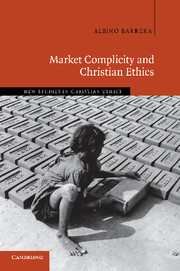PART I - THEORY: MATERIAL COOPERATION IN ECONOMIC LIFE
Published online by Cambridge University Press: 16 May 2011
Summary
Conscientious shoppers willingly pay a much higher price for tuna caught in dolphin- and turtle-free nets. Environmentalists voluntarily embrace a simple lifestyle to minimize their footprint on the ecology. Socially responsible investing is a growing segment of capital markets, covering 11 percent of all funds under professional management in the United States in 2007. Indeed, people intuitively acknowledge their obligations for the harmful ripple effects of their economic transactions. Unfortunately, the academic literature has yet to provide a rigorous theoretical foundation for our moral intuitions on the residual duties we know we owe one another in the marketplace.
The first half of this book lays the groundwork for a theory of economic complicity in wrongdoing or in collective harms. Chapter 1 outlines the scholastic principles of legitimate material cooperation with evil and double effect, the legal doctrine of complicity, and insights from social philosophy on moral complicity. The next three chapters break down the phenomenon of complicity into its three constituent issues. Chapter 2 examines the object of accountability (complicity in what?) and its attendant problem of accumulative harms. Chapter 3 is an account of the basis for accountability (why culpable?) and its concomitant problem of overdetermination. Chapter 4 grapples with the subject of accountability (who is complicit?) and the problem of interdependent economic agencies.
- Type
- Chapter
- Information
- Market Complicity and Christian Ethics , pp. 9 - 10Publisher: Cambridge University PressPrint publication year: 2011

